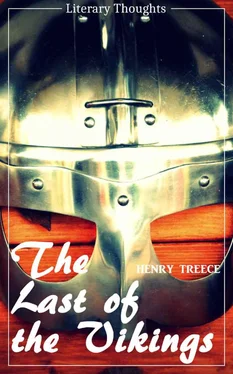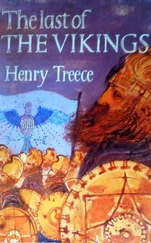It was a hard tussle while it lasted. Some of the Bonders were so quick-sighted that they even caught the spears hurled at them, and returned them at the sender while he was still bent over from the cast. But the house-carles were even brisker; seeing the peasant axes sweeping out, they jumped over them like dancers; at other times, they straddled thrusting spears, like men mounting a war-mad stallion. And always they gave better than they got, using the edge and the horn of the war-axe to bring down their foemen.
There was one old carle, who had been viking every summer for forty years, and knew the world, from Iceland to Jerusalem, like the back of his horny hand. He knew every harbour, and every coastal village where there was a church with a gold cup in it, from Bergen to Antioch. His name was Sigvat and he had lost eight sons on the seas. This made him careless of his own life, but much feared by his enemies.
This day six Bonders came at him, seeing that he was grey-haired and thin-legged, thinking to have him down in a moment. But old Sigvat was not to be taken so lightly. He looked back at Harald and whispered, 'Watch this trick, Sigurdson. If I can bring it off, then at least you will have learned something today.'
Then, with a high shout, he flung away his shield, as though he did not need its protection any longer, and made for the smallest of the Bonders, who was some paces away from his fellows. As the man quailed, taken by surprise, Sigvat dealt him a shoulder-blow, which toppled him among his mates; then, springing sideways, the old viking began to run outside the shield-ring. So, gaining a few yards start, and stringing his foemen out, Sigvat laid five of them low, some with knee-blows, some with thigh-blows, and one even with a stroke made over his shoulder as he went. The sixth Bonder gave up the chase and setting himself to take careful aim, reached Sigvat in the back with a short javelin as his mail-shirt swung upwards in the exertion of running.
Harald was close to tears to witness such a sad end; but Earl Rognvald struck him across the face, just hard enough to bring his mind back to the matter in hand, and said, 'Sigvat is laughing, where he is. Why should a mere boy weep? You should be sharing Sigvat's triumph, my friend, not moping like a woman.'
By now the shield-ring was less than it had been before, and though the Bonders were broken, there were still Danes to reckon with. Rognvald said, 'Let us shift higher up the hill, then they will find us harder to get at. And maybe King Olaf will see us when he has finished his own foraging and will come up to help us.'
Those who were left of the house-carles obeyed the old Earl, and they were formed in a small ring once more just as the Danishmen came out of the wood with their spears.
This was not like the peasants' attack. The Danes ran tight-packed as herrings in a tub, their spears as close-set as a farmyard fence, so that not even a piglet could squeeze between them. Earl Rognvald drew in his breath and said, 'It will be a lucky man whose hair is not smoothed by this comb. See that you do as I do, Harald, and let us have no more swapping blow for blow until the spears have passed. Stand behind me and watch.'
Harald's eyes were everywhere at that moment. He saw his carles valiantly trying to hack the iron-heads from the Dane spears as the push was made; he even saw the captain of the carles go up into the air on one point, still angrily trying to reach its holder with his long axe.
Then he saw the carles break and Danish spears coming in a line at him. 'Down on your knees, you fool!' shouted Earl Rognvald, forgetting himself at such a moment.
Scrambling like weasels, the two slid under the spear-points on hands and knees, and then the Earl called out again, 'Strike at their legs. They cannot get at you now, if they keep their formation. Their points have already passed us.'
So, being jostled here and there, kicked and buffeted in the half-darkness, Harald and the Earl struck out to left and right, all the time shuffling on over the tussocky grass, their mouths and eyes filled with the sand that furious Danish feet kicked up.
And at last they were clear, outside the spear charge, with the grey sky and the white sea-birds over them once more, and the Danes still pushing on away from them towards the banner in the broken shield-ring.
The Earl dragged Harald to his feet. Come,' he gasped, 'we have been fortunate. It would ill become us to throw our luck back in God's face.'
He set off at a run, round a clump of hawthorn-trees, heading for the brow of the hill, so that they could drop behind it out of sight until their surviving men could join them to make another stand.
And so they both lay behind a boulder, fighting for breath, thankful for the lull in the war-play, when down below them they heard a loud mocking voice which said, 'Are you two fellows weary of the game, then? I thought you Norwegians worked a longer day than this. Come down and let me see you.'
Harald turned his head slowly and saw, twenty paces below, a big man sitting by a stream, his shirt open and his helmet on the grass beside him, as though he was enjoying the sunshine. He was eating a piece of bread and in his other hand he held a horn ale-cup. On either side of him stood armed men with their bows drawn and their sharp arrows pointing up the hill towards the boulder which had sheltered Harald and the Earl.
Rognvald placed his sword on the ground beside him and said, 'Out of the cooking-pot into the fire, lad. I thought our luck was too good to last. We have run right into the mouth of King Swein, like a hare into a wolf's jaws. And it is his dinner-time!'
The Danish king stood up, his food in his hand as though this was no battle encounter, and called, 'Must I ask twice? Come down, I say. It would be a bad end to my meal if I had to have these good bowmen skewer you before I had finished my bread and ale.'
Rognvald stood then, grasping his sword by the point-end and letting the ivory handle hang down.
'Come, prince,' he said quietly, 'we must face this out, though we have no stomach for it.'
So, at last, they went down the hill and stood before King Swein of Denmark. Harald noted his thick arms and legs and the fineness of his armour, each black iron scale of which was inlaid with silver in the shape of a dragon. But most of all he noted the Dane-King's face, as brown and wrinkled as well-used Cordovan leather, with a stiff black beard, tinged here and there with grey, and growing right up his cheeks almost to the eyes. And the eyes themselves, light and grey and dancing, like those of a baresark.
'Well,' said the King, 'so now you have looked me over, like a farmer at a market, and what do you think?'
Harald said, 'I think you are the best-looking man I have ever seen, apart from my brother, Olaf. But I think that you are a bad man, for all your warrior face, and it would do my heart good to put an end to you.'
The Dane laughed, his head thrown back, and then he held out his ale-cup to the boy. 'Words break no bones,' he answered, 'and I like a young dog that's not afraid to bark when he meets with a wolf. Drink, my friend, you look thirsty. It would ill become a King to refuse ale to a prince at a time like this.'
At first Harald could not bring himself to take the cup, though his mouth was parched and his tongue as dry as an old piece of oak.
Swein laughed again. 'Come, lad, take it,' he said. 'There's no salt in this ale. It will not bind you to be my friend.'
So, at last, Harald drank and then passed the cup to Earl Rognvald. Swein nodded, smiling, and waved to his men to stand a little farther off. Then, pointing towards the flat stone, he said, 'Now let us sit down and talk of serious things.'
Harald flared up and said, 'There is no thing I wish to talk of with a Dane, save his death.' But old Earl Rognvald took his arm and drew him down on to the rock. And then King Swein said between closed teeth, 'Now you have barked enough, young dog, and we know your courage. But do not tempt the wolf too far. His temper is a short one, and it may be in his mind that you, not he, shall die.'
Читать дальше












